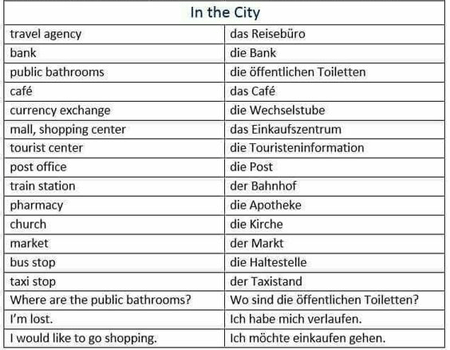

They tell you when things happen, where they happen, and who is acting. However, the most common German words are the glue that holds German conversations together. Those words are fundamental for German learners, of course. You might have been expecting to see basic vocabulary such as household words, days of the week, colors, or months of the year.

It might seem like this list is missing some essentials. The point in learning the 100 most common German words first is that they are the ones you are most likely to hear or read. Vocabulary is a crucial part of learning a new language, you have to understand what words mean to form sentences and hold conversations. Why learn the most used German words first?
#Basic german words in english how to#
The present tense of werden is also used to form the future tense of other verbsĬheck out our guide on German verb conjugation rules to understand how to use these verbs in sentences. When used as the adverb “ lange”, this means “for a long time”Īlso used as an adverb meaning “quite” or “really”įor additional information on this topic, check out our article on common question words and forming questions. Oneself, himself, herself, itself, yourself, themselves Indefinite and Definite Articles German wordĭer ( masc.), das (neut.), die (fem/plural.) Remember: in German, nouns always start with an uppercase letter: German word (with its gender-specific article) Keep reading to discover 100 of the most used - and useful - German words. We’ve broken down the list into different word groups (nouns, verbs, adjectives). If you learn German online, this article will help you understand much of what you read and hear, and give you a solid platform to work from.

These 100 words (which we’ve listed below) are the most commonly used in the German language. Then, we’ll discuss several ways you can practice using these essential words so that you remember them forever. You'll be fluent before you can say " Apfelstrudel".This article will show you the 100 most common German words with definitions and give examples of how they’re used. To help you along in your language-learning journey, check out Brainscape's seminal guide to learning a language efficiently and don't forget to get our certified German flashcards in your corner! Learning a language isn't just a rewarding way to connect with other people and another culture-it can also help you connect better with English (which sounds completely weird but, as you've now seen after learning these 20 words, isn't really). To be forced to move (a bad situation in chess) 20. Schadenfreudeīeing joyful about the sufferings of others. " Health", which you say to someone when they sneeze. Neander(tal) is the proper name of a valley in Germany Taler (not used in this form) = inhabitant of the valley ‘Gänger’ (not used in this form derivated from the verb gehen = to go) = ‘walker’ So, in the spirit of discovery, we put together a list of 20 German words used in English and translated them for you.

But I'd bet good money you didn't know their actual translations until this point!Īt Brainscape, we love those a-ha! moments when you discover something deeper about a word or thing you'd never considered before. Sure, as a native speaker of English, you know the meaning of these words and understand them. Or 'safari', which is the Arabic word for "travel". Take, for example, 'shampoo', which is Hindi for "massage", as part of a Turkish bath process. Once these " loanwords" become incorporated into everyday vocabulary, people tend to forget that they actually began their lives as competely foreign words! Like every other language, English contains a wealth of words that at some point have been "borrowed" from other languages.


 0 kommentar(er)
0 kommentar(er)
